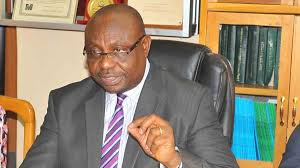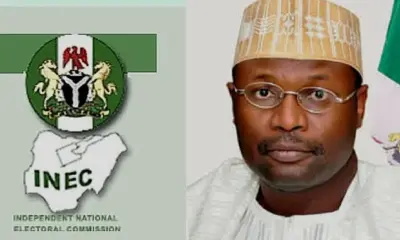News
INEC counters credibility criticism with data

The Independent National Electoral Commission, INEC, has responded to credibility criticism presenting data to counter claims made in The Guardian newspaper’s report titled “INEC’s credibility sinks as 94% contested posts await tribunal.”
In a statement made available to CAPITAL POST on Thursday by the National Commissioner & Chairman, Information and Voter Education Committee, Sam Olumekun mni,said, “Basic fact check on the information regularly published by the Commission and available on our website would have shown that in 2023, elections were not conducted in 1,280 constituencies”

According to the Commission, the claim that State Assembly elections were held in only 28 States of the country is made on the lazy assumption that no such elections were held in the eight States of the federation where executive elections are held off-cycle.
Olumekun said, “First, basic fact check on the information regualrly published by the Commission and available on our website would have shown that in 2023, elections were not conducted in 1,280 constituencies, including 782 State Assembly seats. On the contrary, elections were conducted in 1,491 constituencies across the country made up of 1 Presidential, 28 Governorship, 109 Senatorial, 360 House of Representatives and 993 State Assembly constituencies.”
“Similarly, the claim that State Assembly elections were held in only 28 States of the country is made on the lazy assumption that no such elections were held in the eight States of the federation where executive elections are held off-cycle.
“As every attentive Nigerian knows, the tenure of legislators is tied to the legislative houses which is a fixed term of four years from the date the Assembly is inaugurated unlike the term of office of the executive which begins from the date they take the oath of office,”he explained.
He continued,”Secondly, the report blames the pre-election cases arising from the conduct of primary elections by political parties on INEC. These are intra-party cases involving party members in which they join the Commission and seek for reliefs binding on it. As everyone knows, INEC does not conduct primaries for political parties.
“Thirdly, in pursuit of their right under the law, many litigants in Nigeria unfortunately file election petitions over the most improbable cases and later withdraw them or they are dismissed by the tribunals. If the report had taken time to analyse the outcome of the cases decided so far by the tribunals, it would have discovered that out of 1,196 petitions, 712 were dismissed and 179 withdrawn.”
He noted, “This means that in 891 cases (74.4%), the tribunals found no merit in the petitions and affirmed the result of the elections conducted by INEC. It is surprising how the mere filing of petitions constitute a blot on the integrity of the recent elections conducted by INEC when in fact they constitute an integral part of the democratic process.
“Fourthly, the said report analysed the total number of petitions as if they were filed against the outcome of the election in 94% of all the elective positions without considering details of the cases. Multiple petitions were filed by candidates and political parties as petitioners in a single Constituency.
“Five, it is pertinent to note that the grounds for challenging the outcome of an election as provided in Section 134 of the Electoral Act, 2022 are not limited to the conduct of election by the Commission. An election may be questioned on the ground that the winner of the election was not qualified to contest the election by virtue of his academic qualifications, age etc.
” Many of the petitioners did not challenge the conduct of the elections by INEC but the eligibility of candidates or their nomination by political parties. Under the law, INEC has no power to screen candidates. Similarly, only the Courts can disqualify candidates.
“Six, a comparative analysis would have addressed the deliberate effort in the report to portray the 2023 General Election as regressive on account of litigation without empirical evidence. Over the last three electoral cycles, the number of election petitions may be rising but not the number of upturned elections. In 2015, 663 cases were filed at the tribunals, 87 (13.1%) were nullified and the Commission ordered to conduct re-run in some polling units or entire constituencies.
“In 2019, 807 petitions were filed but elections were only re-run in 30 (3.71%) consituencies (3 Senatorial Districts, 13 Federal Constituencies and 14 State Constituencies).
“While the 2023 post-election litigations are ongoing, all five petitions filed in respect of the Presidential election were dismissed while three are pending on appeal. As of Monday 16th October 2023, out of 82 Governorship election petitions, 72 (87.8%) were either dismissed or withdrawn by the petitioners. For Senatorial elections, 146 petitions were filed out of which 100 (68.5%) were dismissed or withdrawn. For the House of Representatives, 413 petitions were filed out of which 309 (74.81%) were dismissed or withdrawn while for State Houses of Assembly, 550 petitions were filed out of which 468 (82.4%) were dismissed or withdrawn,”he said.
























